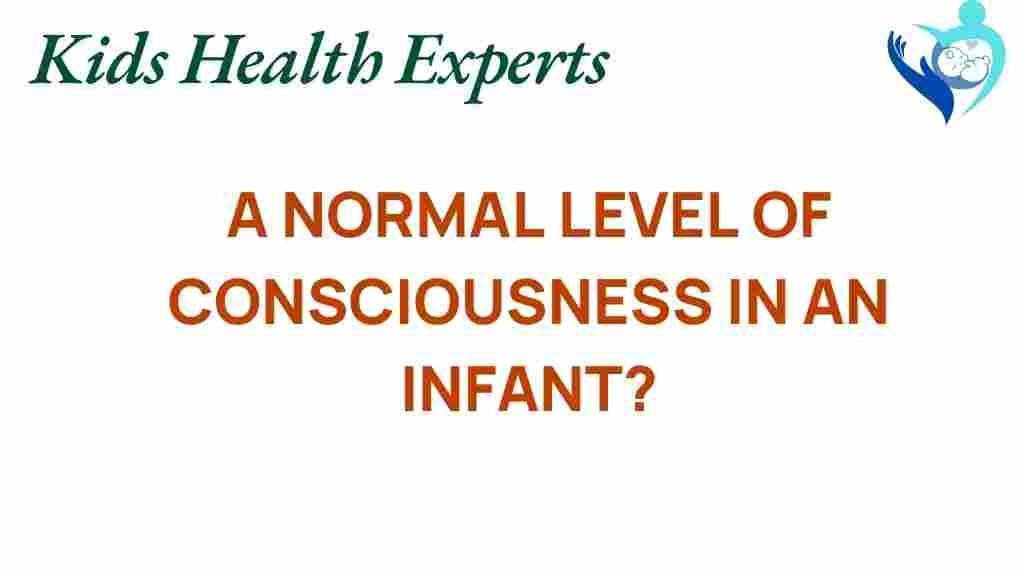Understanding the Normal Level of Consciousness in Infants: A Guide to Infant Consciousness
Infant consciousness is an intriguing area of study that has significant implications for child development and pediatric health. Understanding how infants develop cognitive awareness and their neurological assessment can help parents and caregivers support their children as they reach developmental milestones. In this article, we will explore the normal level of consciousness in infants, the early signs of cognitive development, and provide useful parenting tips.
The Basics of Infant Consciousness
Infant consciousness refers to the awareness and responsiveness of an infant to their environment. This includes their ability to perceive, process, and respond to stimuli. Understanding infant consciousness is crucial for parents and healthcare professionals, as it lays the foundation for cognitive development and overall health.
Developmental Milestones and Infant Consciousness
As infants grow, they achieve various developmental milestones that are indicative of their level of consciousness and cognitive awareness. Here are some key milestones:
- 0-2 Months: Infants primarily exhibit reflexive responses. Their consciousness is mainly driven by basic needs such as hunger and comfort.
- 2-4 Months: Babies begin to smile and engage with caregivers, showing early signs of social awareness.
- 4-6 Months: Infants start to babble and reach for objects, indicating growing cognitive skills and curiosity about their environment.
- 6-12 Months: At this stage, infants demonstrate more intentional actions such as crawling and exploring. They recognize familiar faces and respond to their names.
- 12-24 Months: Toddlers become more independent, using basic words and showing an increased understanding of their surroundings.
Early Signs of Cognitive Awareness
Recognizing the early signs of cognitive awareness can help parents monitor their infant’s development effectively. Here are some signs to watch for:
- Responding to sounds and voices
- Tracking objects with their eyes
- Smiling in response to social interactions
- Demonstrating curiosity about new objects
- Engaging in playful interactions
Neurological Assessment of Infant Consciousness
A neurological assessment is essential for understanding an infant’s level of consciousness and cognitive development. Pediatricians typically evaluate an infant’s neurological health through a variety of methods, including:
- Reflex Checks: Observing natural reflexes such as grasping and rooting.
- Response to Stimuli: Assessing how well an infant responds to light, sound, and touch.
- Developmental Screening: Using standardized tools to evaluate developmental milestones.
- Parental Observations: Encouraging parents to report any concerns about their child’s behavior and development.
Parenting Tips for Supporting Infant Consciousness
As a parent, there are several ways you can foster your child’s cognitive awareness and overall development:
- Engage in Play: Interactive playtime promotes cognitive skills. Use toys that stimulate the senses and encourage problem-solving.
- Read Regularly: Reading to your infant can enhance language acquisition and cognitive development.
- Encourage Exploration: Allow your child to safely explore their environment to develop curiosity and independence.
- Establish Routines: Consistent routines help infants feel secure and can enhance their ability to anticipate and understand their environment.
- Monitor Development: Keep track of milestones and consult with a pediatrician if you have concerns.
Potential Challenges and Troubleshooting Tips
While most infants develop normally, some may experience challenges. Here are some common issues and tips for addressing them:
- Lack of Response: If your infant seems unresponsive or does not react to stimuli, consult a pediatrician to rule out any underlying issues.
- Delayed Milestones: If your child is not meeting developmental milestones, seek guidance from healthcare professionals for assessments and interventions.
- Excessive Fussiness: Understand that fussiness can be a part of normal development, but if it seems excessive, consider factors like hunger, discomfort, or overstimulation.
Conclusion: Embracing Your Infant’s Journey of Consciousness
Understanding infant consciousness is vital for nurturing child development and ensuring pediatric health. By recognizing the signs of cognitive awareness and supporting your baby’s journey through developmental milestones, you can foster a healthy, responsive environment. Remember that every child develops at their own pace and that staying informed and engaged is key to supporting your child’s growth.
For more information on child development, check out this resource on parenting tips. If you have any concerns about your infant’s health, don’t hesitate to reach out to a healthcare professional or pediatrician.
By staying proactive and informed, you can provide your infant with the best possible start in life. Your awareness and involvement will make a significant difference in their cognitive development and overall well-being.
This article is in the category Conditions and created by KidsHealthExperts Team
